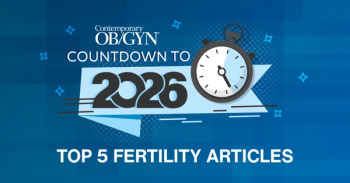
Chromosomal abnormalities do not impact ART outcomes
Chromosomal abnormalities in infertile couples who use assisted reproductive technology (ART) do not appear to impact cumulative clinical pregnancy or live-birth rates, according to a study published in the Annals of Medicine.
Although clinicians should offer preimplantation genetic testing (PGT) to prospective parents with chromosomal rearrangements, authors add, no evidence supports its universal use in this population.
“The data we analyzed have a certain significance for clinical decision-making involving assisted reproductive technology for couples with chromosomal abnormalities,” authors wrote. Findings also provide a helpful reference for fertility experts and genetic counselors, they added.
The study included 107 infertile couples with chromosomal abnormalities who presented at Chengdu Women’s and Children’s Central Hospital in Chengdu, China, and refused PGT after genetic counseling. To minimize sampling error, investigators compared pregnancy outcomes and related factors against those of 223 chromosomally normal control couples matched 2:1 by female age, type of infertility (primary or secondary), and type of ART (intrauterine insemination, in vitro fertilization/IVF, or intracytoplasmic sperm injection/ICSI).
Couples with and without chromosomal abnormalities had almost identical cumulative clinical pregnancy rates—74.8% versus 81.6%, respectively (P = 0.150).1 Cumulative live-birth rates (defined in China as at least 28 weeks gestation) were 65.4% and 69.1%, respectively (P = 0.508). Investigators also found no significant differences in cumulative miscarriage rates, metaphase II oocyte counts, embryo counts, good-quality embryo counts, or number of embryo transfer procedures performed.
After adjusting for all other factors in multivariate analysis, only female age and infertility type had significant impact on pregnancy and live-birth rates. Additionally, couples that underwent ICSI required fewer embryo transfer procedures, a finding that could stem from having a greater proportion of chromosomal abnormalities in male study patients.
Infertility rates have reached 25% in China and beyond,2,3 and 1.3% of infertile patients possess chromosomal abnormalities.4 “Genetic counseling and discussion of possible preimplantation genetic testing should be offered when a structural rearrangement (translocation, inversion, deletion, or insertion) is discovered in a patient,” authors wrote. They also recommend confirming PGT results via chorionic villus sampling or amniocentesis. However, authors added, the evidence suggests that universal use of PGT for aneuploidy (PGT-A) is premature. This technology can erroneously label euploid embryos as aneuploid,5 and what to do with apparently mosaic embryos remains unclear.6
Although some clinic operators covet the cutting-edge reputation and increased income associated with PGT,7 authors said that justifying the procedure’s high cost remains difficult. “In the light of current no evidence whatsoever (supporting) the benefit of PGT, some infertile patients who are carriers of chromosomal abnormalities refuse PGT after genetic counseling and request random selection of embryos when they seek ART.”
PGT-based embryo selection may improve pregnancy outcomes after initial embryo transfer, authors allowed. “However, it remains uncertain whether PGT improves the cumulative live-birth rate as compared with conventional IVF.” The study’s findings moreover support the position that PGT is not properly validated in carriers of chromosomal abnormalities. Study limitations include its small sample size and single-center design, along with the fact that PGT results were not included.
REFERENCES:
1. Cui L, Wang F, Lin Y, Li M. Reproductive outcomes of infertile couples undergoing assisted reproductive technology who are carriers of chromosomal abnormalities: a retrospective cohort study. Ann Med. 2022;54(1):2302-2308. doi:10.1080/07853890.2022.2112069
2. Jesus AR, Silva-Soares S, Silva J, Severo M, Barros A, Dória S. Reproductive success of assisted reproductive technology in couples with chromosomal abnormalities. J Assist Reprod Genet. 2019;36(7):1471-1479. doi:10.1007/s10815-019-01486-x
3. Zhou Z, Zheng D, Wu H, et al. Epidemiology of infertility in China: a population-based study. BJOG. 2018;125(4):432-441. doi:10.1111/1471-0528.14966
4. McFadden DE, Friedman JM. Chromosome abnormalities in human beings. Mutat Res. 1997;396(1-2):129-140. doi:10.1016/s0027-5107(97)00179-6
5. Tiegs AW, Hodes-Wertz B, McCulloh DH, Munné S, Grifo JA. Discrepant diagnosis rate of array comparative genomic hybridization in thawed euploid blastocysts. J Assist Reprod Genet. 2016;33(7):893-897. doi:10.1007/s10815-016-0695-3
6. Greco E, Minasi MG, Fiorentino F. Healthy babies after intrauterine transfer of mosaic aneuploid blastocysts. N Engl J Med. 2015;373(21):2089-2090. doi:10.1056/NEJMc1500421
7. Griffin DK, Ogur C. Chromosomal analysis in IVF: just how useful is it? Reproduction. 2018;156(1):F29-F50. doi:10.1530/REP-17-0683
DISCLOSURES:
The study was funded by Chengdu Women’s and Children’s Central Hospital.
Newsletter
Get the latest clinical updates, case studies, and expert commentary in obstetric and gynecologic care. Sign up now to stay informed.









